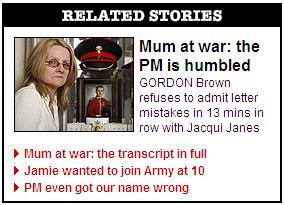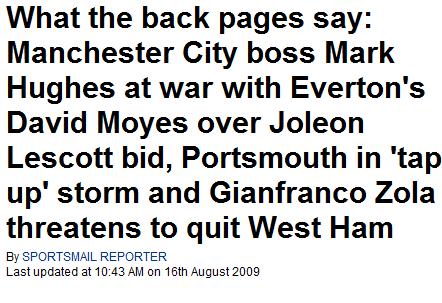 For a newspaper that prides itself in being attuned to its readers’ sentiments, it is odd to see The Sun so out of step on the Jamie Janes affair. Odd but not unique.
For a newspaper that prides itself in being attuned to its readers’ sentiments, it is odd to see The Sun so out of step on the Jamie Janes affair. Odd but not unique.
Prime minister Gordon Brown may not be wildly popular across the country but many feel he is victim of a smear.
As the BBC’s Nick Robinson noted on his blog and on the Ten O’Clock News last night, it’s “clear from the phone-ins, the text messages, the blogs and the like that many share that sympathy [with Brown]”.
And that includes those who have passed judgement on The Sun’s website itself.
To take some of the most recent comments:
Asleroth: I truly am sorry for her loss. but give Brown a break, at least he went out of his way to even write a personal HAND written letter, most people would not have even done that, even the Queen does not send out hand written letters it’s all computer
jessicauk: [sic] fell sorry for the pm, seems nothing he does nowadays is right.
Jamie-101: Yes, the view that the note contains 25 spelling mistakes is clearly that of an illiterate who does not generally write by hand. Quite odd and disgusting to reduce the conflicts and the loss of life to this utterly puerile level. Brown is wrong on many things; he is honourable in writing thus.
The last time I can recall a national newspaper being so out of step with its readership (or should that be its commentariat?) was when the Daily Mail published an interview with former Guantanamo Bay detainee, Binyam Mohamed.
Here is a flavour of the reaction to a reasoned and largely sympathetic piece with Mohamed, a victim of “medieval” torture, who, let’s not forget, was not found guilty of any terrorist acts:
Ship him back to Ethiopia and stop using my taxes to house and feed him!
This man is NOT BRITISH, illegally entered the country, went to Pakistan (for help in beating his drug habit – yeah, right!) so, to be blunt – WHO CARES.
You put yourself in the Terrorist arena mate so you take the consequences of your action.
Er…. go away sunshine.
The backlash, far more predictable perhaps, has echoes of the more recent case.
But where the Daily Mail may have expected a negative reaction, The Sun is left slightly stunned.
Related:
– The Sun’s sympathy for a grieving mother… or simple exploitation?
– Daily Mail Ends Moderation. Will Anybody Notice?
 For a newspaper that prides itself in being attuned to its readers’ sentiments, it is odd to see The Sun so out of step on the
For a newspaper that prides itself in being attuned to its readers’ sentiments, it is odd to see The Sun so out of step on the 

 (Hat tip: @
(Hat tip: @
 It was one of the more entertaining tit-for-tats of the week. The
It was one of the more entertaining tit-for-tats of the week. The  One headline, 35 words, four Premier League clubs, three managers and one player. The URL is even more brazen, moving the valueless ‘What the pages say’ to the end and limiting the generic, connector words:
One headline, 35 words, four Premier League clubs, three managers and one player. The URL is even more brazen, moving the valueless ‘What the pages say’ to the end and limiting the generic, connector words: